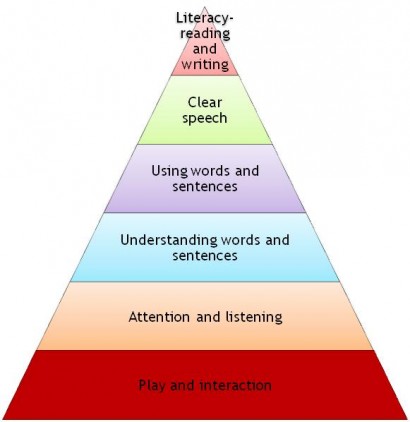Visual support to enhance understanding of the written and spoken word
Everyone benefits from backing up writing and speech with signs, pictures and symbols. This promotes independence and helps students understand rules, routines and information. Imagine an alien landing in your school. Would they easily be able to find their way round and know how the day works?
Colour coded maps, room labels with photos of the teacher or what happens in the room and staff boards in the foyer with named photos help students and visitors navigate the building.
Classrooms with consistent colour coding for areas and pictures to show where equipment is kept reduces anxiety and helps understanding, as do visual timetables showing the structure of the day or part of a lesson, like getting dressed for PE.
The use of symbol supported learning materials in lessons makes the curriculum accessible to all. When worksheets, stories, task instructions and new vocabulary are accompanied by symbols and pictures, this helps understanding of words and instructions and allows pupils to work through tasks with increasing independence.

Symbol supported learning materials in lessons makes the curriculum accessible to all
Ensuring that adults communicate in ways that support language development
The way that parents and teachers interact with pupils has the strongest effect on how their communication skills emerge. Information on typical language development and the strategies that encourage this should be shared with staff and parents.
Some ‘Golden Rules’ can be created, which teachers and parents agree to try and adopt, for example, allowing extra thinking time for pupils to respond to questions is a simple rule that can have wide reaching consequences for all pupils.
Creating surroundings which facilitate good communication
The physical environment has a huge impact on how well pupils can listen and talk, but schools do not always take this into consideration. It’s helpful to think about the auditory surroundings in school. What are the acoustics of the classroom like? Can the teacher’s voice be heard, if not, what would improve this?
The visual environment is also key. Are there lots of visual distractions in areas where children are expected to concentrate?
Classroom displays can bring learning to life but can be visually distracting which is problematic for all children, especially those with listening and attention difficulties. Considering placing displays away from areas where children are expected to work and having clear wall spaces there instead is useful.
Is there adequate lighting? Having the light source in front of the teacher is preferable as spoken information is heavily supported by non-verbal information like lip movements, facial expression and eye contact.
Classrooms which have clearly defined areas create a more organised environment which pupils can navigate easily. Making specific areas which are conducive to talking is beneficial for pupils of all ages.
As with any whole school plan it’s vital that a top-down approach is taken to ensure that the key features are embedded into everyday practice.
It’s helpful for school leadership teams to give staff and governors information around the links between communication skills and raising educational attainment in order to encourage an understanding of why changes need to be made.
Including actions about communication development in the school action plan ensures that adaptations to the school environment are followed through. Teacher training is also crucial and local speech and language therapy services are the best starting point to investigate training that is on offer.
A helpful resource is the Communication Trust’s ‘Communication Commitment’which provides a comprehensive guide to creating a whole school approach to boosting talking and listening skills.
Incorporating speaking and listening activities into lesson planning for all subject areas creates time for talk during the day and raises the status of ‘just talking’ to be in line with the status given to reading and writing. Celebrating positive communication skills through speaking and listening awards or communication mentor schemes also raises the profile.
Lastly, and perhaps most importantly, none of this would be successful without involving parents. Parental engagement is crucial to every aspect of a child’s school career. Sharing information via newsletters, bulletin boards and parent talks about what the school is aiming for and how parents can support this at home is essential.
Our schools are likely to be subjected to yet another barrage of policy changes in the near future. However, teachers and parents can safeguard the success of pupils by making consistent and effective adaptations to the school environment now, to enable all students to be able to communicate to the best of their abilities in the future.
Fiona Barry is a speech and language therapist and runs Talking Tips for Kids












